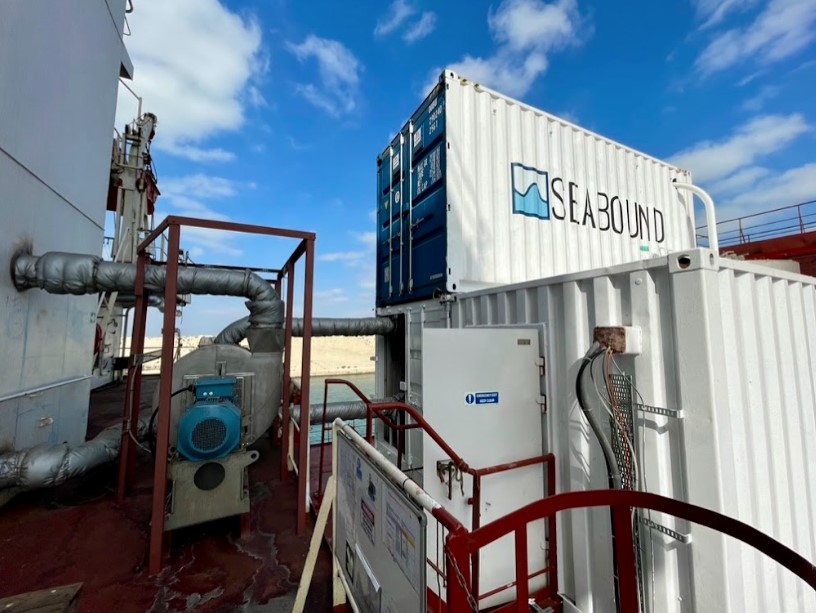London-based carbon capture start-up Seabound is celebrating proof of its contribution to stripping carbon emissions from commercial shipping.
Container shipping is estimated to account for 3% of global carbon emissions, and is considered one of the hardest sectors to abate.
The company developed equipment for container ships, using a proprietary second-generation CCUS technique known as calcium looping. The method transforms gas-based pollution into solid pebbles of calcium carbonate, easily offloaded at port for reuse or for sale.
In a Turkish shipyard Seabound had its ‘scrubbing’ system retro-fitted to the ‘Sounion Trader’, a vessel big enough to carry 3,200 containers, and operated by freighting giant Lorimar.
Two months of sea trials on voyages around the Mediterranean saw a massive one-tonne a day of CO2 extracted from the vessel’s diesel exhaust. The kit’s maiden voyage saw 78% of carbon captured, along with more than 90% of atmospheric sulfur.
Those tests lay the foundation for larger-scale installations, Seabound says. The innovator believes its system has the potential to capture up to 95% of CO2 emissions from a ship’s exhaust.
Seabound and its experimenting partner jointly secured £1.2 million in grant funding from the UK government, under last year’s round of Whitehall’s £23 million Clean Maritime Demonstration competition.
“Our pilot project demonstrates we can capture emissions directly onboard ships, in a simple and cost-effective way”, said the innovator’s co-founder Alisha Fredriksson.
“This breakthrough demonstrates that the shipping industry doesn’t have to wait for new fuels or solutions to reduce its emissions in the future. We can start to capture carbon from the existing fleet today.”
At its partner LomarLabs, managing director Stylianos Papageorgiou was enthusiastic.
“Seabound’s technology presents an attractive and viable solution to reducing carbon emission, with a technology that is simple to install, operate and maintain,”,. “We are excited to join Seabound’s mission and believe their technology could be instrumental in driving a cleaner future for maritime transport.”
Marine risk managers, including Lloyd’s Register, approved the operating profile of the firm’s techology.
Seabound is now focusing on delivering full-scale CCUS systems next year for commercial operation. Recognising its technology’s revolutionary potential, the firm’s investors include Y Combinator, Lowercarbon Capital and Eastern Pacific Shipping.




